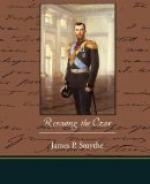My ticket, for which they asked me 12,000 rubles, was obtained through the cook’s sweetheart, and I left Petrograd on the 6th for Moscow on the usual 12:30, and arrived uneventfully at the depot in Moscow next morning at about 10:30.
On the stairs of the Nikolaevsky depot I stopped. Where was I going? In fact I had never thought of it. I had no place, no destination, no desires—nothing. Perhaps only one desire, to avenge myself and all of us.
So I hesitated, for in Moscow they had been shooting right and left for the past week, persecuting the burjoois and officers. I had never felt so helpless and so unnecessary to myself and to others as on this snowy morning in Moscow. Besides, all of the way from Petrograd to Moscow I had had a hideous headache and chills, and I was in a fog of indifference.
“Good morning, sir,” said an astonishingly polite voice behind me, “I congratulate you upon a safe arrival.”
I turned around and saw a man of rather short stature, cleanly shaven, and politely smiling with the whole width of his mouth.
“Good morning,” I said, “I cannot place you, but you seem familiar to me, I am sure.”
“That’s due to my former occupation, your Excellency. I am Goroshkin, the usher from the Ekaterinensky Theatre. So sorry to apprehend of your sorrow, Sir, in connection with her Excellency’s death.”
This man, Goroshkin, was a real friend to me, although I hardly recollected him. We never used to pay much attention to the ushers!
There was no use in trying to go to a hotel with my appearance of a gentleman and my pockets filled with money; my fever and my indifference were growing; I had no desire to do anything for myself. I think that Goroshkin understood me and the state of my mind when he said, “May I venture to offer Your Excellency my humble house, and perhaps call a doctor?”
This is as much as I remember of the next fortnight. I had a terrible attack of typhus,—and when communists were killing the boys from the military school, bombarding the Hotel National, destroying the Kremlin and pillaging private homes, I was quietly lying in a little house somewhere behind Sukharev Tower under the care of a doctor and Goroshkin’s fat sister, whose conspicuous parts of the corsage were soiled from cooking, and whose face was always red and radiant. My return to life, and with it my return to the desire for activity and eating, was commemorated by the appearance at my bed of nobody else but Marchenko.
One bright morning, when my room seemed to be full of sunshine and hope,—a man in the uniform of a communist soldier with a red rag on his coat sleeve, walked into the room bringing in a breath of fresh and frosty air and a whole arsenal of munitions. I did not recognize him at first, a little pointed beard and heavy boots had transformed him into a regular “tovarishch.”
“Hello,” he said, “glad to know you’re alive.”




